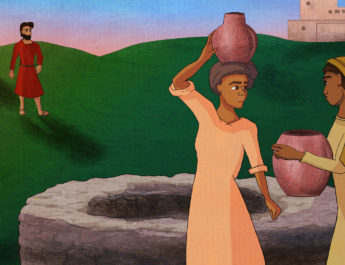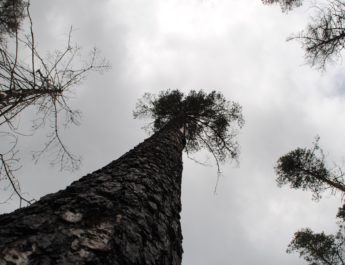Exodus 24:12-18
Transfiguration of the Lord A
12 The LordA said to Moses,B “Come upC to me on the mountainD and waitE there;
A “Lord” = YHVH. From havah (to be, become) or hayah (to come to pass, become, be). This is the name of the God of Israel, the self-existent and eternal one, the tetragrammaton. This pronunciation has been lost to time so “Lord” is generally used in its place.
B “Moses” = Mosheh. From mashah (to pull out in a literal or figurative sense, to draw out) OR from Egyptian mes or mesu (child, son i.e. child of…). This is Moses – the one drawn out from the water, which is to say, rescued. If derived from the Egyptian, his name would share a root with Rameses and Thutmose.
C “come up” = alah. This is to go up, approach, ascend, be high, be a priority; to arise in a literal or figurative sense.
D “mountain” = har. From harar (hill or mountain). This is mountain, hill, hilly region.
E “wait” = hayah. Related to “Lord” in v12. See note A above.
I will giveF you the tabletsG of stone,H with the lawI
F “give” = natan. This is to give, put, set, offer. It is to give literally or figuratively.
G “tablets” = luach. Root likely means glistening, so this would refer to a tablet as being polished in some sense, whether it’s made of stone, wood, or metal.
H “stone” = eben. This is a stone, weight, or mason. It is part of the word “Ebenezer.”
I “law” = torah. From yarah (to throw, shoot, be stunned; to flow as water so figuratively to instruct or teach). This is law, instruction, teaching, or statute. It can also refer to the first five books of the Bible – the Torah.
and the commandment,J which I have writtenK for their instruction.”L
J “commandment” = mitsvah. From tsavah (to charge, command, order, enjoin). This is a commandment, law, ordinance obligation, or tradition. It is something commanded whether by God or by a human authority. This term is sometimes used collectively to refer to the Law.
K “written” = kathab. This is to inscribe, write, record, or decree.
L “instruction” = yarah. Related to “law” in v12. See note I above.
13 So Moses set outM with his assistantN Joshua,O and Moses went upP onto the mountain of God.Q
M “set out” = qum. To arise, stand, accomplish, establish, abide. This is rising as in rising against, getting up after being sick or asleep, arising from one state to another, becoming powerful, or rising for action. It can also be standing in a figurative sense.
N “assistant” = sharath. This is ministering, serving, or waiting on. It can refer to one offering service as a worshipper or one serving as a servant.
O “Joshua” = Yehoshua. Related to “Lord” and “wait” in v12. From YHVH (see note A above) + yasha (to deliver, defend, help, preserve, rescue; properly, to be open, wide or free, which implies being safe. So, in a causative sense, this is to free someone). This is Joshua, Jeshua, or Yehoshua, which means “the Lord is salvation.”
P “went up” = alah. Same as “come up” in v12. See note C above.
Q “God” = Elohim.
14 To the eldersR he had said, “WaitS here for us, until we come backT to you.
R “elders” = zaqen. From the same as zaqan (beard or chin – the beard represents old age). This is old, aged, or elder.
S “wait” = yashab. This is to sit and so to remain and so to dwell. It is sitting for any reason – as a judge, in order to ambush, or just sitting quietly. Causatively, this can mean settling or marrying. This can also mean continue, endure, or establish.
T “come back” = shub. To turn back, return, turn away – literally or figuratively. Doesn’t necessarily imply going back to where you started from. This is also the root verb for the Hebrew word for repentance “teshubah.”
Look,U AaronV and HurW are with you;
U “look” = hinneh. From hen (lo! Behold! If, though; an expression of surprise). This is to draw attention, show suddenness or surprise, or to emphasize the importance of the coming statement. See! Lo! Behold!
V “Aaron” = Aharon. Derivation uncertain. May mean “bearer of martyrs” OR be related to Ancient Egyptian ꜥḥꜣ rw (warrior lion) OR elevated, exalted, high mountain. This is Aaron. See https://en.wiktionary.org/wiki/Aaron
W “Hur” = Chur. 15x in OT. From chavar (to be or become white or pale) OR from the same as chur (white things, white, white linen) OR from the same as chur (hole; a hole that was bored; a crevice where a snake lives; the cell of a prison). This is Hur or Chur, its meaning is uncertain.
whoeverX has a disputeY may goZ to them.”
X “whoever” = baal. From ba’al (to marry, have dominion, be master). This is lord, owner, ally, master, or archer.
Y “dispute” = dabar. From dabar (to speak, declare, discuss). This is speech, a word, a matter, an affair, charge, command, message, promise, purpose, report, request. It is a word, which implies things that are spoken of in a wide sense.
Z “go” = nagash. This is to draw, bring, or come near. It is approaching for any reason – as an attack on an enemy, in order to worship, to make an argument. It can also be used as a euphemism for sex.
15 Then Moses went up on the mountain, and the cloudAA coveredBB the mountain. 16 The gloryCC of the Lord settledDD
AA “cloud” = anan. May be from anan (cover, cloud over; figuratively, acting in a secret way, practicing magic or soothsaying). This is a cloud as something that covers the sky.
BB “covered” = kasah. This is to cover, conceal, overwhelm. It is to cover as clothes do or to hide a secret.
CC “glory” = kabod. From kabad (to be heavy, weighty, burdensome). This is weighty. Figuratively, glorious, abundant, riches, honor, splendor – a reference to one’s reputation or character. This word is often used to describe God and God’s presence.
DD “settled” = shakan. This is to settle down in the sense of residing somewhere or staying there permanently. It can mean abide or continue. “Mishkan,” taken from this verb, is the Hebrew word for the Tabernacle (as a place where God abided).
on MountEE Sinai,FF and the cloud covered it for sixGG days;HH
EE “Mount” = har. Same as “mountain” in v12. See note D above.
FF “Sinai” = Sinay. Probably from the same as Sin (Sin, a city meaning “clay” or “bush);{perhaps from asam (to gather, store) OR from seneh (thorn bush) OR related to Aramaic siyn (a god called Sin) OR perhaps Hebrew siyn (related to mud or clay)}. This is Sinai – a place whose name may mean “bush of the Lord” or “muddy.” See https://www.abarim-publications.com/Meaning/Sinai.html
GG “six” = shesh. This is six. Figuratively, it can be a surplus since it is one more than the number of fingers on the hand.
HH “days” = yom. Root may mean being hot. This is the day in a literal or figurative sense. It can also mean birth, age, daylight, continually or other references to time.
on the seventhII day he calledJJ to Moses out ofKK the cloud. 17 Now the appearanceLL of the glory of the Lord was like a devouringMM fireNN
II “seventh” = shebii. From sheba (seven – the number of perfection/sacred fullness). This is seventh.
JJ “called” = qara. This is to call or call out – to call someone by name. Also used more broadly for calling forth.
KK “out of” = tavek. This is among, middle, in the midst, the center. Perhaps, properly, to sever.
LL “appearance” = mareh. From raah (to see, show, stare, think, view; to see in a literal or figurative sense). This is sight, appearance, or vision. It can be a view, seeing itself, that which is seen, something real, or a vision one sees.
MM “devouring” = akal. This is to eat, devour, burn up, or otherwise consume. It can be eating in a literal or figurative sense.
NN “fire” = esh. This is fire, burning, flaming, hot. It is fire in a literal or figurative sense.
on the topOO of the mountain in the sightPP of the Israelites.QQ
OO “top” = rosh. This may come a word that means to shake. It is the head, captain, or chief. It can also be excellent or the forefront. It can be first in position or in statue or in time (i.e. the beginning).
PP “sight” = ayin. This is eye in a literal or figurative sense so eye, appearance, favor, or a fountain (the eye of the landscape).
QQ “Israelites” = ben + Yisrael. Literally, “children of Israel.” Ben is from banah (to build or obtain children). This is son, age, child. It is son in a literal or figurative sense. Yisrael is related to “God” in v13. From sarah (to persist, exert oneself, contend, persevere, wrestle, prevail) + el (see note Q above). This is Israel, meaning God strives or one who strives with God; new name for Jacob and for his offspring. This refers to the people and to the land.
18 Moses enteredRR, SS the cloud and went up on the mountain. Moses was on the mountain for fortyTT days and forty nights.UU
RR “entered” = bo. This is to enter, come in, advance, fulfill, bring offerings, enter to worship, attack. It can also have a sexual connotation.
SS {untranslated} = tavek. Same as “out of” in v16. See note KK above.
TT “forty” = arbaim. From the same as arba (four); from raba (to make square or be four-sided); perhaps from raba (to lie down flat; can be to lie for mating). This is forty.
UU “nights” = layil. Properly, this refers to light twisting away. It is used for night or midnight. Figuratively, this can mean adversity.
Image credit: “Volcano Del Fuego Erupting” by Arden, 2017.




